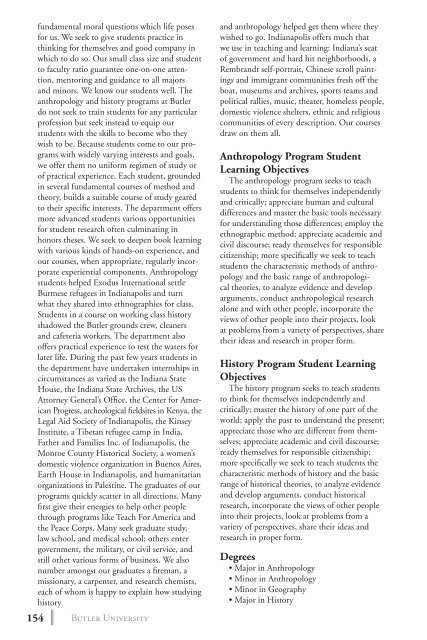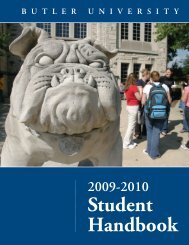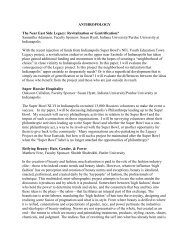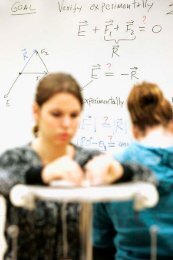2 0 1 3 bulletin - Butler University
2 0 1 3 bulletin - Butler University
2 0 1 3 bulletin - Butler University
Create successful ePaper yourself
Turn your PDF publications into a flip-book with our unique Google optimized e-Paper software.
154<br />
fundamental moral questions which life poses<br />
for us. We seek to give students practice in<br />
thinking for themselves and good company in<br />
which to do so. Our small class size and student<br />
to faculty ratio guarantee one-on-one attention,<br />
mentoring and guidance to all majors<br />
and minors. We know our students well. The<br />
anthropology and history programs at <strong>Butler</strong><br />
do not seek to train students for any particular<br />
profession but seek instead to equip our<br />
students with the skills to become who they<br />
wish to be. Because students come to our programs<br />
with widely varying interests and goals,<br />
we offer them no uniform regimen of study or<br />
of practical experience. Each student, grounded<br />
in several fundamental courses of method and<br />
theory, builds a suitable course of study geared<br />
to their specific interests. The department offers<br />
more advanced students various opportunities<br />
for student research often culminating in<br />
honors theses. We seek to deepen book learning<br />
with various kinds of hands-on experience, and<br />
our courses, when appropriate, regularly incorporate<br />
experiential components. Anthropology<br />
students helped Exodus International settle<br />
Burmese refugees in Indianapolis and turn<br />
what they shared into ethnographies for class.<br />
Students in a course on working class history<br />
shadowed the <strong>Butler</strong> grounds crew, cleaners<br />
and cafeteria workers. The department also<br />
offers practical experience to test the waters for<br />
later life. During the past few years students in<br />
the department have undertaken internships in<br />
circumstances as varied as the Indiana State<br />
House, the Indiana State Archives, the US<br />
Attorney General’s Office, the Center for American<br />
Progress, archeological fieldsites in Kenya, the<br />
Legal Aid Society of Indianapolis, the Kinsey<br />
Institute, a Tibetan refugee camp in India,<br />
Father and Families Inc. of Indianapolis, the<br />
Monroe County Historical Society, a women’s<br />
domestic violence organization in Buenos Aires,<br />
Earth House in Indianapolis, and humanitarian<br />
organizations in Palestine. The graduates of our<br />
programs quickly scatter in all directions. Many<br />
first give their energies to help other people<br />
through programs like Teach For America and<br />
the Peace Corps. Many seek graduate study,<br />
law school, and medical school; others enter<br />
government, the military, or civil service, and<br />
still other various forms of business. We also<br />
number amongst our graduates a fireman, a<br />
missionary, a carpenter, and research chemists,<br />
each of whom is happy to explain how studying<br />
history<br />
<strong>Butler</strong> <strong>University</strong><br />
and anthropology helped get them where they<br />
wished to go. Indianapolis offers much that<br />
we use in teaching and learning: Indiana’s seat<br />
of government and hard hit neighborhoods, a<br />
Rembrandt self-portrait, Chinese scroll paintings<br />
and immigrant communities fresh off the<br />
boat, museums and archives, sports teams and<br />
political rallies, music, theater, homeless people,<br />
domestic violence shelters, ethnic and religious<br />
communities of every description. Our courses<br />
draw on them all.<br />
Anthropology Program Student<br />
Learning Objectives<br />
The anthropology program seeks to teach<br />
students to think for themselves independently<br />
and critically; appreciate human and cultural<br />
differences and master the basic tools necessary<br />
for understanding those differences; employ the<br />
ethnographic method; appreciate academic and<br />
civil discourse; ready themselves for responsible<br />
citizenship; more specifically we seek to teach<br />
students the characteristic methods of anthropology<br />
and the basic range of anthropological<br />
theories, to analyze evidence and develop<br />
arguments, conduct anthropological research<br />
alone and with other people, incorporate the<br />
views of other people into their projects, look<br />
at problems from a variety of perspectives, share<br />
their ideas and research in proper form.<br />
History Program Student Learning<br />
Objectives<br />
The history program seeks to teach students<br />
to think for themselves independently and<br />
critically; master the history of one part of the<br />
world; apply the past to understand the present;<br />
appreciate those who are different from themselves;<br />
appreciate academic and civil discourse;<br />
ready themselves for responsible citizenship;<br />
more specifically we seek to teach students the<br />
characteristic methods of history and the basic<br />
range of historical theories, to analyze evidence<br />
and develop arguments, conduct historical<br />
research, incorporate the views of other people<br />
into their projects, look at problems from a<br />
variety of perspectives, share their ideas and<br />
research in proper form.<br />
Degrees<br />
• Major in Anthropology<br />
• Minor in Anthropology<br />
• Minor in Geography<br />
• Major in History
















